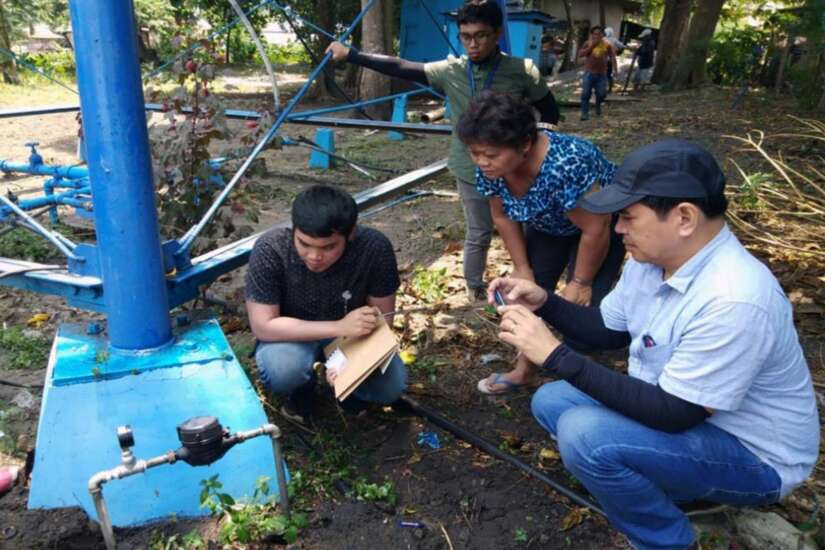Small-scale utilities bring clean water to local communities in the Philippines
IT’S 8 p.m. in Barangay Mabuhay, a vibrant community on the southern Philippine island of Mindanao, but resident Jovelyn Ruta isn’t getting ready for bed. Instead, she bustles around the kitchen, filling pots and pans with water.
When she finishes collecting water, she moves outside to pour the water into a large bucket, where she scrubs her laundry.
Barangay Mabuhay is one of several communities on the outskirts of General Santos City that is not connected to the main water service provider. Instead, it relies on Rural Waterworks and Sanitation Associations. These small-scale water utilities usually have only one pumping station and an elevated water tank, with a distribution pipeline system.
After chores, Jovelyn refills her buckets with water for the next day. She and her husband manage a backyard business selling poultry and animal feed, which also require an adequate supply of water. However, limited access to clean water provides little hope for growing her business.
Where Help is Needed
Rural Waterworks and Sanitation Associations often face challenges in providing clean water.
“We cannot meet the current water demand of our consumers, we have no proper pipe distribution system, and we have financial constraints,” said Freddie Giducos, president of the Mabuhay Klinan 3 Waterworks and Sanitation, Inc.
Freddie’s small-scale water utility is one of 174 in the city. With six water pumping stations, this association provides water to more than 2,000 households in Barangay Mabuhay. However, as the number of households increases, the utility struggles to meet consumer needs, forcing Jovelyn and other residents to stay up late into the evening doing chores.
“This has been happening for years,” Jovelyn said. “We’ve lived here since 2012 and are used to this routine.”
In 2018, USAID, through the Strengthening Urban Resilience for Growth with Equity project, started helping 25 Rural Waterworks and Sanitation Associations in General Santos City identify water production challenges and integrate climate and disaster resilience into water safety planning. In the planning process, they used climate information and hazard maps.
In response to the findings of USAID-supported diagnostic assessments, Freddie’s utility allotted about $73,500 (Php3.5 million) to expand and develop a new water source and climate-resilient pumping station, based on a 15-year projected water demand. This is expected to improve services later this year so residents like Jovelyn can have more consistent water access.
In coordination with the government and other partners, USAID also helped the small-scale utilities ensure safe drinking water for Jovelyn and other residents by installing meters and water chlorinators, testing residual chlorine levels bi-weekly, and analyzing the water monthly.
Meanwhile, utility officers and staff attended training and mentoring sessions with USAID on improving their operations.
Improvement in Batangas City
Rural Waterworks and Sanitation Associations in Batangas City, a regional agro-industrial center just south of the capital Manila, adopted the same approach as those in Mindanao.
More than 31 percent of the city’s water supply is provided by 72 small-scale water utilities. Of those, 13 are located at higher elevations and cannot provide enough water to their communities; when those communities do have water, the pressure is still not strong enough.
“We have a water supply rotation schedule so we can serve all households in the upland areas,” said Batangas City Planning and Development Coordinator Sonny Godoy.
After a series of USAID-conducted training and mentoring sessions, 20 small-scale water utilities located new groundwater sources, and six of them invested a total of $126,800 (Php6.1 million) to develop them.
This expansion will provide clean water to about 3,500 households with insufficient water supply and create new water connections for around 480 households.
Looking Ahead
General Santos and Batangas are partner cities of USAID through the Cities Development Initiative (CDI). The CDI, a whole-of-mission urban approach, advances the development of cities outside Metro Manila as inclusive, environmentally sustainable, and resilient engines of growth.
In addition to helping water service providers improve operations and delivery service management, USAID also helps CDI cities adapt, innovate, and respond to the challenges of COVID-19. Solid infrastructure, diverse water sources, and straightforward safety control measures provide more resilience to the impacts of climate change.
“We are deeply thankful to USAID for the assistance they have given us. We have learned a lot about how to improve our operations. The studies conducted by USAID helped us serve our communities better.”
— Freddie Giducos, president of a small utility providing water to 2,000 households in Barangay Mabuhay
Once these improvements are completed, Jovelyn and her neighbors will no longer have to spend their precious evenings collecting water and doing chores. As clean water flows from their faucets, so hope and opportunity flow into their lives .

